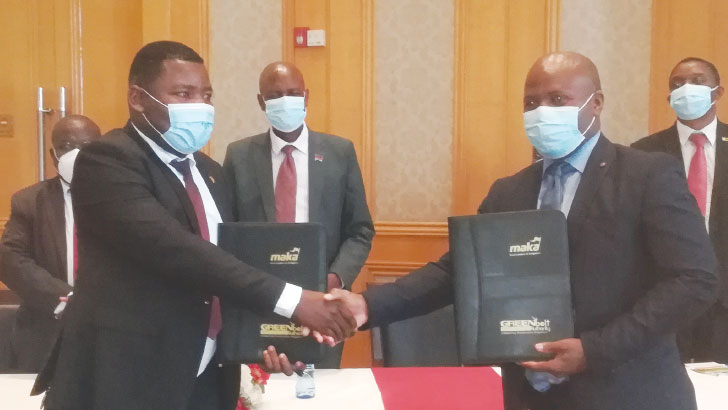ZIM firm eyes wheat,Legumes production
Zimbabwe’s irrigation and water engineering firm Maka Resources has outlined plans to invest in the country’s commercial production of wheat and legumes in partnership with the Greenbelt Authority (GBA).
Maka Resources chief executive officer Innocent Sibanda unveiled the plans in Lilongwe on Tuesday after signing a memorandum of understanding (MoU) with GBA for the development of commercial irrigation projects in the country.
He did not quantify how much the firm will invest in the commercial irrigation ventures, saying they are at the planning stage and consolidating the figures.

Said Sibanda: “There is so much potential in Malawi, which we can exploit together to feed our own people.
“We are dealing with irrigation technology and with climate change, there is no agriculture without irrigation.”
Figures from the Ministry of Agriculture show that Malawi imports about 98 percent of wheat despite the weather being ideal for growing the crop.
“Zambia and Zimbabwe is producing wheat, why not here in Malawi? Trials have already been conducted here by some companies and results are positive,” said Sibanda.
He said they are also eyeing production of soya bean and Alfalfa, a crop in the legume family, to add value to them and export to countries such as China and India.
The MoU, according to Sibanda, is a follow up on President Lazarus Chakwera’s visit to Zimbabwe last year where government officials discussed available irrigation investment opportunities in Malawi’s agriculture sector.
As an interested investor, he said they made a follow-up trip to Malawi to get first-hand information on the available investment opportunities.
Minister of Agriculture Lobin Lowe, who presided over the signing ceremony, said the national budget is constrained; hence, calling on the private sector to seriously consider investing in the irrigation sector.
He said: “After relying on rain-fed agriculture for a long time, irrigation is the way to go in line with the Malawi 2063. We stand to benefit a lot from Zimbabwe as it is advanced in irrigation technology.
“The Malawi Government, through the Greenbelt Authority, wants to invite the private sector to fully participate in the irrigation sector.”
GBA acting chief executive officer Amon Mluwira said the MoU will result in the establishment of a special purpose vehicle to mobilise resources to develop irrigation schemes and agro-processing facilities for value addition.
He said GBA has a lot of irrigable land nationwide, but what has been lacking is capital for investment.
“We have been relying on the government subvention for our projects which have not been enough, so through this agreement, we believe that we will be able to mobilise resources and make tangible investments,” he said.
In an earlier interview, National Association of Smallholder Farmers in Malawi chief executive officer Betty Chinyamunyamu said irrigation is game-changer as it is a catalyst for transforming the country’s agricultural production systems.
She said what is critical is to examine the production models to ensure that they include smallholder farmers in the targeted areas, adding that there is need for a robust market development.
Agricultural policy and development expert Tamani Nkhono Mvula said earlier that large-scale irrigation ventures are key to boosting agricultural output.
“I hope that GBA has put in place mechanisms to deal with the challenges associated with this kind of investments,” he said.
Nkhono Mvula said the problems to do with land, access to water, electricity and others have left many of the ambitious projects to be on paper despite the hype they created.
GBA has three known joint ventures, one with the Indian AUM Sugar and Allied Limited running Salima Sugar Company and an Israeli company, Inosselia Agro Africa Limited running the horticultural Greenbelt Greenhouse Limited as well as the Nchalo Greenbelt Initiative Limited in partnership with Nchalo Smallholder Cane Growers Association.
There have been growing calls from experts for the country to embark on serious irrigation investments to spur economic development.
Maka Resources manufactures technologies such as pivots irrigation, solar-powered systems, supplies grain drying technology and drip irrigation systems.
The GBA has been wooing the private firms both local and foreign to partner it in the implementation of various irrigation projects to transform the agriculture sector.





